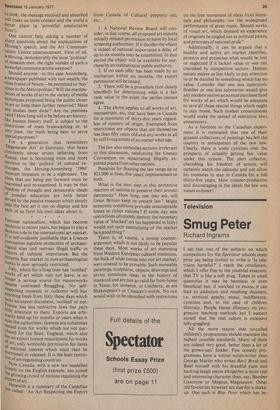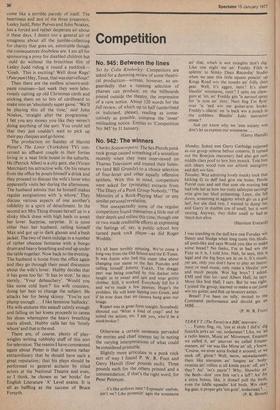Television
Smug Peter
Richard lngrams
I see that one of the subjects on which competitors for the Spectator schools essay prize are being invited to write is 'Is television harmful ?' I reach the conclusion, which I offer free to the youthful essayists, that TV is like a soft drug. Taken in small quantities it may be harmless or even beneficial but, if watched to excess, it can lead to addiction and resulting disasters, i.e. terminal apathy, ennui, indifference, cynicism and, in the case of children illiteracy. People blame illiteracy on progressive teaching methods but I suspect myself that the real culprit is excessive telly-goggling.
All the more reason that so-called children's programmes should maintain the highest possible standards. Many of them are indeed very good, better than a lot of the grown-ups' fodder. Few comedy programmes have a wittier script-writer than George Martin who writes Basil Brush and Basil himself with his dreadful puns and hacking laugh seems altogether a more real and interesting character than, say, Bamber Gascoyne or Magnus Magnusson. Other old favourites however are due for a shakeup. One such is Blue Peter which has be
come like a terrible parody of itself. The heartiness and zest of the three presenters,
Lesley Judd, Peter Purves and John Noakes, has a forced and rather desperate air about it these days. I detect too a general air of
smugness about all the jumble-collecting for charity that goes on, admirable though
the consequences doubtless arc. I am all for sponsoring a pony for disabled children but ould do without the breathless film of Lesley Judd riding it round a paddock— 'Gosh. This is exciting! Well done Rags! (Pant pant) Hey, Tessa, that was marvellous !'
Then there are the endless scissors-andpaste routines—last week they were laboriously cutting up old Christmas cards and sticking them on to bits of cardboard to make into an 'absolutely super game.' We'll be playing this all the time,' said John Noakes, 'straight after the programme.' I bet you any money you like they weren't doing anything of the sort. You could tell that they just couldn't wait to pick up their pay cheques and go home.
The production on Sunday of Harold Pinter's The Lover (Yorkshire TV) concerned an affluent couple in their forties living in a neat little house in the suburbs. He (Patrick Allen) is a city gent, she (Vivien Merchant) his attractive wife. On his return from the office he pours himself a drink and they proceed to discuss the wife's lover who apparently visits her during the afternoons. The husband admits that he himself makes regular assignations with 'a whore.' They discuss various aspects of one another's infidelity in a spirit of detachment. In the second act Mrs Thing dresses herself up in a slinky black dress with high heels to await her lover. Surprise, surprise. It is none other than her husband, calling himself Max and got up in dark glasses and a bush jacket. The two of them indulge in a number of rather obscene fantasies with a bongo drum and heavy breathing and end up under the table together. Now back to the evening. The husband is home from the office again and they go through their usual discussion about the wife's lover. Hubby decides that it has gone too far. 'It has to stop,' he says sternly. 'Your debauchery'. 'Would you like some cold ham?' his wife counters, doing her best to change the subject. He attacks her for being skinny. 'You're not plump enough ... I like feminine bullocks'. His wife endures this assault calmly enough and falling on her knees proceeds to caress his shoes whereupon the heavy breathing starts afresh, Hubby calls her his 'lovely whore' and that is the end.
There are, of course, plenty of playwrights writing rubbishy stuff of this sort for television. The reason I have commented again about Pinter is that it seems rather extraordinary that he should have such a great reputation; that his plays should be performed to general acclaim by titled actors at the National Theatre and even, so I think, be chosen as 'set books' for English Literature 'A' Level exams. It is all as baffling as the success of Bruce Forsyth.



































 Previous page
Previous page